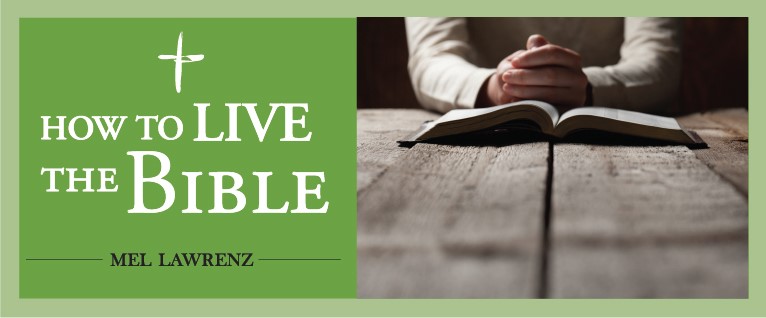
This is the eighty-seventh lesson in author and pastor Mel Lawrenz’ How to Live the Bible series. If you know someone or a group who would like to follow along on this journey through Scripture, they can get more info and sign up to receive these essays via email here.
See Mel Lawrenz’s book, How to Understand the Bible.
Here’s a word from Jesus’ Sermon on the Mount that we would do well to ponder within the first waking hour of every day: “Therefore I tell you, do not worry about your life, what you will eat or drink; or about your body, what you will wear.” It doesn’t get any more practical than that.

In the Sermon on the Mount, Jesus made some of the preeminent statements in Scripture about the providence of God. He was addressing one of the universal pressing questions we all ask: Who is going to take care of me? At your 80th birthday that question might have a special urgency, but in truth it is no less urgent when one is 20.
The answer?
“Your heavenly Father knows you need them,” so don’t get caught in the rat race or, we might say, the pagan chase (“the pagans run after all these things”). There is a better alternative, in other words, to living a life of hoarding. As someone said, the problem with the rat race is that even if you win, you’re still a rat. Our security does not come from the bank’s statement telling us how much we’ve saved, or from the number of suits in the closet. Food in the pantry is a good thing. But no matter how much any of us have to eat or drink or wear or drive or shelve, we will never know security until we see the face of providence: the God who clothes the lilies of the field and who tends to the birds of the air. And he knows. He knows what we have and what we need. He knows those days when we have less than we think we need, too.
Sparrows fly, but they also fall. But not one of them falls to the ground apart from the will of the Father (Matthew 10:29). This year may be a time for any of us to feed and fly and travel far, or it may be the year of a broken wing—or that final plummet. And that is where providence figures in more powerfully than anywhere else.
The fact of pain and loss and even overt evil does not nullify the reality of providence. While we try to explain the dark, the greater reality will always be the light. The only reasonable explanation for the way things work is that the Creator of all things keeps it all going day by day.
There are a thousand things that could go wrong with my body right now, but at the moment it seems to be working just fine. My breakfast is being converted from fuel to energy and the oxygen my lungs are sucking in is making bluish blood turn red and rich. My brain is sending thousands of commands a second, and my heart muscle is relentlessly contracting like a fist, pushing lifeblood to every external and internal cell. I’m not amazed that I can so easily get sick or injured. I’m astonished that my body works as well as it does. And there is only one explanation: a continual divine care.
But hearts don’t always work right, and sooner or later they all stop. Some pregnancies end in miscarriage. At the moment there are at least a dozen wars going on in the world. There are crimes against property and person, and unspeakable things that go on behind closed doors. But the incidents where things don’t work well are set against the backdrop of so many healthy days, and good relationships and proper exchanges. Generosity, forgiveness, forbearance, support, patience, kindness: these are among the many gifts given every day. And there is only one explanation for this: a divine governance.
The proof of providence is the fact that it never stops raining for good, living things do keep growing, and that the human race keeps reaching out for hope and life. In some ways the creation keeps asserting itself. It is irrepressibly alive, even though pieces of it keep dying. But more importantly, the Creator keeps asserting himself. God keeps saying, I’ve made what I’ve made. And I will keep it going and growing, and recreate when I need to.
___________
[If you believe this series will be helpful, this is the perfect time to forward this to a friend, a group, or a congregation, and tell them they too may sign up for the weekly emails here]
Mel Lawrenz (@MelLawrenz) trains an international network of Christian leaders, ministry pioneers, and thought-leaders. He served as senior pastor of Elmbrook Church in Brookfield, Wisconsin, for ten years and now serves as Elmbrook’s teaching pastor. He has a PhD in the history of Christian thought and is on the adjunct faculty of Trinity International University. Mel is the author of 18 books, including How to Understand the Bible—A Simple Guide and Spiritual Influence: the Hidden Power Behind Leadership (Zondervan, 2012). See more of Mel’s writing at WordWay.
The post How to Live the Bible — Life and Worry appeared first on Bible Gateway Blog.











